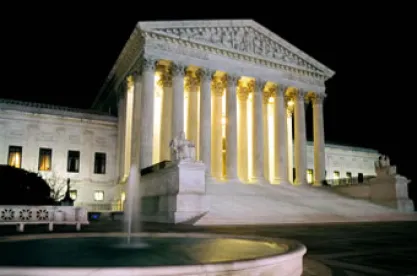On May 16, 2016, the Supreme Court issued its heavily anticipated decision in Spokeo, Inc. v. Robins, which examined whether Congress can confer constitutional standing on plaintiffs who have not suffered an injury aside from the defendant’s statutory violation. In sum, the Court found that a plaintiff who suffers the statutory injury defined in a consumer protection statute may not have suffered an injury sufficiently “concrete” to confer standing.
In Spokeo, Plaintiff Thomas Robins sued Spokeo, an online search company, claiming that Spokeo was a credit-reporting agency under the Fair Credit Reporting Act, and therefore liable for statutory damages of $1,000 or more for reporting incorrect information that may have caused him to have a more difficult time finding a job. The District Court dismissed Robins’s complaint for lack of standing, but a Ninth Circuit panel reversed the dismissal. The Ninth Circuit noted that Robins had alleged that “Spokeo violated his statutory rights, not just the statutory rights of other people,” and, that “Robins’s personal interests in the handling of his credit information are individualized rather than collective.” Based on these two observations, the Ninth Circuit held that Robins had adequately alleged injury in fact, a requirement for standing under Article III of the Constitution.
In a 6-to-2 opinion by Justice Alito, the Supreme Court vacated the Ninth Circuit’s decision and remanded the case to the Ninth Circuit to examine whether Robins alleged an injury that was both “concrete and particularized.” “We have made it clear time and time again that an injury in fact must be both concrete and particularized,” wrote Alito, who added that certain types of mistakes would not qualify. “An example that comes readily to mind is an incorrect zip code. It is difficult to imagine how the dissemination of an incorrect zip code, without more, could work any concrete harm.”
In doing so, the Court held that Congress cannot ignore Article III requirements by simply granting a right to sue for statutory violations. The Court stated, “Congress’ role in identifying and elevating intangible harms does not mean that a plaintiff automatically satisfies the injury-in-fact requirement whenever a statute grants a person a statutory right and purports to authorize that person to sue to vindicate that right” including, for example, where a plaintiff relies upon allegations of a “bare procedural violation, divorced from any concrete harm.” The Court held that to establish an injury in fact for standing, a plaintiff must show that he or she suffered “an invasion of a legally protected interest” that is “concrete and particularized” and “actual or imminent, not conjectural or hypothetical.”
So what does this mean? Is this a victory for defendants? Yes, but narrowly. The plaintiffs’ lawyers are going to have to do a much better job of pleading their cases to show “concrete injury.” And even where a plaintiff alleges a concrete injury, Spokeo’s focus on the “risk of real harm” to each individual plaintiff could potentially frustrate attempts to later certify a class. However, other than the zip code example, the decision does not offer much guidance to either party on what “concrete” injuries are. As such, there is likely to be just as much litigation before the courts with very little certainty on how each court will define the meaning of “concrete” in consumer actions related to privacy including the Fair Credit Reporting Act and the Telephone Consumer Protection Act.





 />i
/>i

